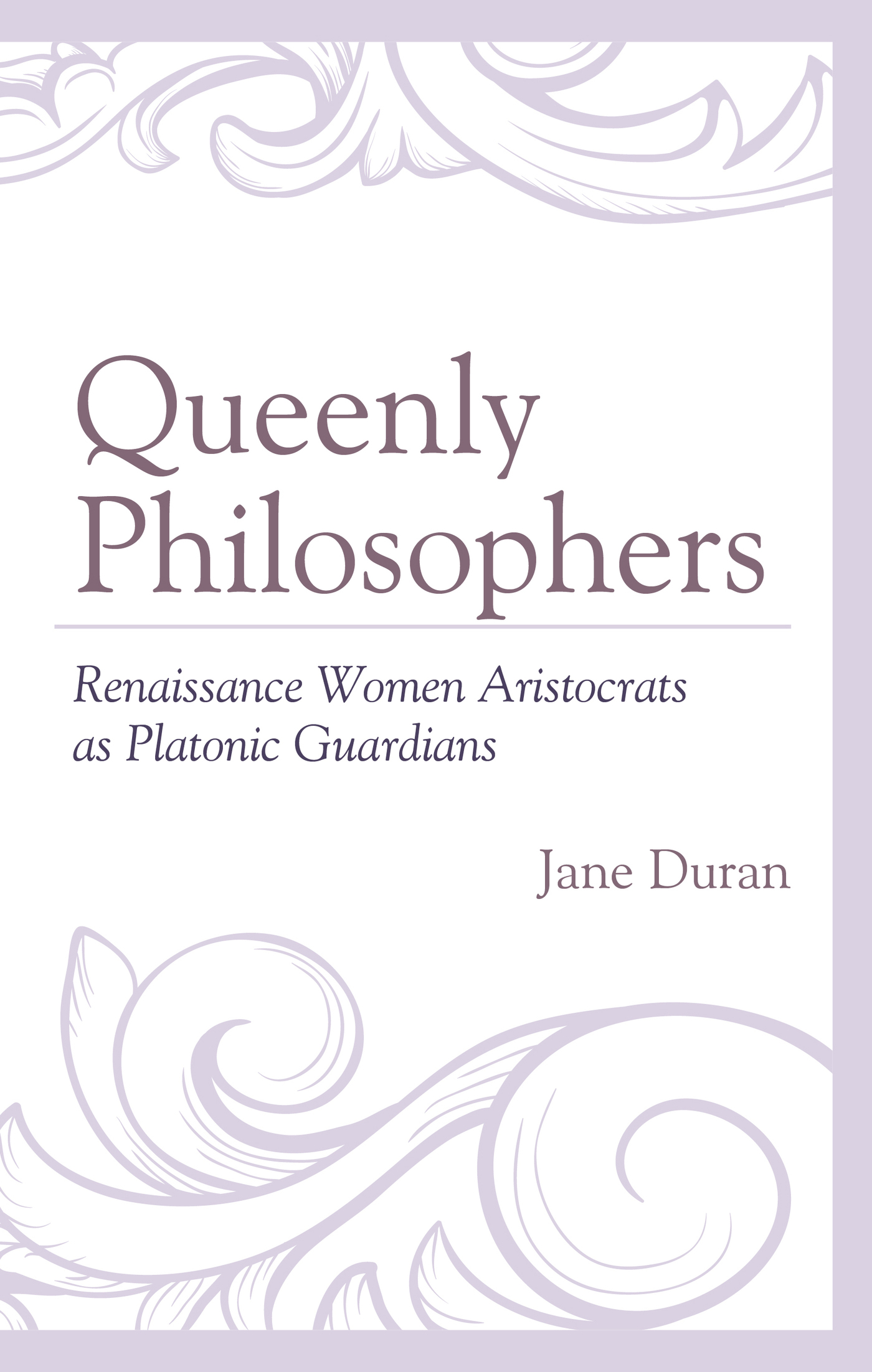Queenly Philosophers
Queenly Philosophers
Renaissance Women Aristocrats
as Platonic Guardians
Jane Duran
LEXINGTON BOOKS
Lanham Boulder New York London
Published by Lexington Books
An imprint of The Rowman & Littlefield Publishing Group, Inc.
4501 Forbes Boulevard, Suite 200, Lanham, Maryland 20706
www.rowman.com
Unit A, Whitacre Mews, 26-34 Stannary Street, London SE11 4AB
Copyright 2017 by Lexington Books
All rights reserved. No part of this book may be reproduced in any form or by any electronic or mechanical means, including information storage and retrieval systems, without written permission from the publisher, except by a reviewer who may quote passages in a review.
British Library Cataloguing in Publication Information Available
Library of Congress Cataloging-in-Publication Data
Names: Duran, Jane, author.
Title: Queenly philosophers : Renaissance women aristocrats as Platonic guardians / Jane Duran.
Description: Lanham : Lexington Books, 2017. | Includes bibliographical references and index.
Identifiers: LCCN 2017030335 (print) | LCCN 2017031513 (ebook) | ISBN 9781498541374 (electronic) | ISBN 9781498541367 (cloth : alk. paper)
Subjects: LCSH: Women philosophers. | Platonists. | Philosophy, Renaissance. | Philosophy, ModernHistory17th century.
Classification: LCC B105.W6 (ebook) | LCC B105.W6 D874 2017 | DDC 192.082dc23 LC record available at http://lccn.loc.gov/2017030335
 TM The paper used in this publication meets the minimum requirements of American National Standard for Information Sciences Permanence of Paper for Printed Library Materials, ANSI/NISO Z39.48-1992.
TM The paper used in this publication meets the minimum requirements of American National Standard for Information Sciences Permanence of Paper for Printed Library Materials, ANSI/NISO Z39.48-1992.
Printed in the United States of America
For philosophers and philosophically oriented thinkers everywhere
Preface
Notions of social class recur in our various analyses of historical events, but seldom seem to appear in our work on the lives of philosophers, or even on the milieus in which they worked. Nevertheless, the philosophical thinking of the sixteenth through eighteenth centuries was very much the product of aristocratic circles, the intersection of the well to do with those circles, and the extent to which aristocrats had access to the printed work of their time. Examination of this set of circumstances is even more necessary for the work of women thinkers, since a woman working alone would be much less likely to be able to discover other thinking and written work than even a man doing research at that time. Thus the import of the exposure of women aristocrats to a great deal of the intellectual debate of their dayin whatever centuryhas seldom received the examination that it merits.
A particularly rich period of intellectual ferment was the sixteenth century in Britain and Europe, a period intensely examined by standard historians, but probably not as well scrutinized by chroniclers of intellectual history as it should be, no doubt in part because of the complexity and difficulty of the debates, and because of our inability to grasp what it was that the debates were about. The sixteenth century topics of freedom of will, the nature of the host, in sacramental terms, and the validity of the concept of contact between a believer and the deity without the need of an intermediary seem fairly far removed from matters that might be discussed today, even in religious circles. But these topicsstaples in the debates between Dissenters and the established Churchwere not only important to intellectuals of the day, but had an added importance for aristocratic women. Women, seen as the articulators and caretakers of a certain sort of moral standpoint, were often intensely involved in these debates, particularly as they occurred in aristocratic circles.
Three women of this period, Mary Sidney Herbert, the Countess of Pembroke, Henry VIIIs sixth spouse, Katherine Parr, and Elizabeth I can be shown to be philosophically oriented thinkers in their own right and, more important, insofar as they were aristocrats (and, indeed, even queens) they become to some extent exemplars of that difficult Platonic concept, the woman Guardian. Although Plato said very little about what women Guardians would do, the discussion of this topic in contemporary literature by a number of philosophers indicates the importance of the notion. This text is constructed in such a manner that each chapter can be read independently, regardless of chronology, but the thread connecting the chapters is, of course, the concept of Guardianship and the extent to which we can think of women aristocrats of the sixteenth and seventeenth centuries as the embodiments of it. Separate introductory chapters bring the reader into the events of the two demarcated periods, and the debateswhether they be theological, with respect to the advent of science, or related to some other philosophical matterare set out in such a way that the chapters on the individual thinkers then follow. Advertence is made both to London and outlying areas, and attempts are made to fill in the blanks on how intellectual matters affected everyday functioning. In addition, the notion that philosophy often meets us in a literary guise is addressed, and this concept is particularly relevant to the work of Pembroke.
Our analysis of the seventeenth century is somewhat easier for those with standard philosophical training, as Margaret Cavendish, for example, has long been associated with the philosophical canon. But even here, the ties to the Court and other somewhat non-standard aspects of her work require elucidation, and that is certainly the case for our one thinker who was not actually an aristocrat, but an associate of aristocrats (Aphra Behn). Although questions having to do with empirical matters and the norms of science were often at the forefront, writing during this era was often more or less literary, as had been the case in the preceding decades. Again, our difficulty is not only to acquaint ourselves with the writings of these women thinkers, but to try to see how some allusion to the concept of Guardianshipthat office of the intellectuals to which Plato made referencehelps to fill out the notion of what it is that a woman Guardian would actually do. As we shall see, women aristocrats of a period of roughly two centuries were more than active in intellectual circles, and notions of care and duty frequently drove their work. (Here, the examples of Katherine Parr and Elizabeth I are particularly relevant.)
We might close by noting that, whether it would seem to be initially related or not, contemporary thinking on gender construction is part and parcel of the theorizing that we do. Our sense that there is a way in which women and girls often use, for lack of a better term, a different voice, is very much related to what it was that women in aristocratic circles were asked to do during this centuries ago era. If one of the tasks of the Guardians, as set out in Republic, was to identify and assist younger intellectuals and to further the intellectual voice in the greater society, then these Renaissance women were indeed women Guardians of their time.
Acknowledgments
As we proceed along our paths of academic work, we often find that problems, however familiar, strike us in new and differing ways after years of research and teaching. Our undergraduate and graduate readings of Plato, for instance, may take on another cast after exposure to historical recountings of the work of intellectuals of varying periods, or after reading extended commentary on problems in the Platonic corpus, and attempting to teach them. A salient example of this sort of intellectual problem is that of the role of the woman Guardian in Platos
Next page
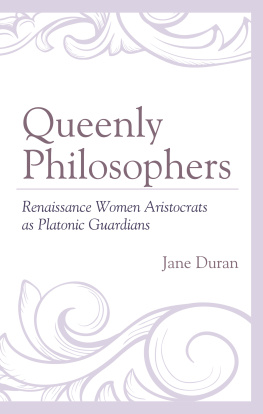


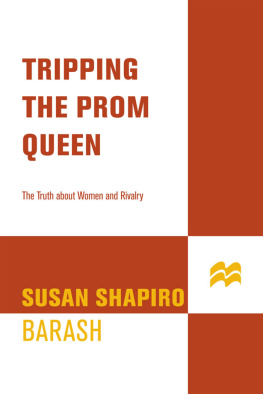


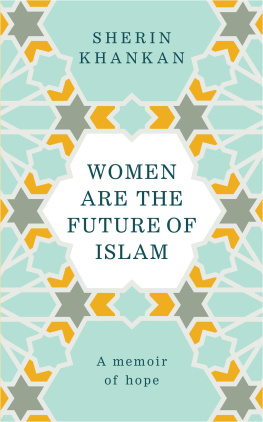
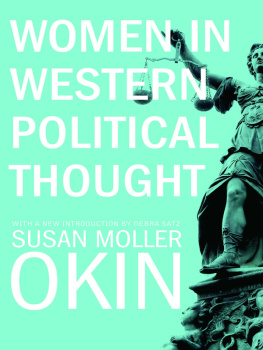

 TM The paper used in this publication meets the minimum requirements of American National Standard for Information Sciences Permanence of Paper for Printed Library Materials, ANSI/NISO Z39.48-1992.
TM The paper used in this publication meets the minimum requirements of American National Standard for Information Sciences Permanence of Paper for Printed Library Materials, ANSI/NISO Z39.48-1992.